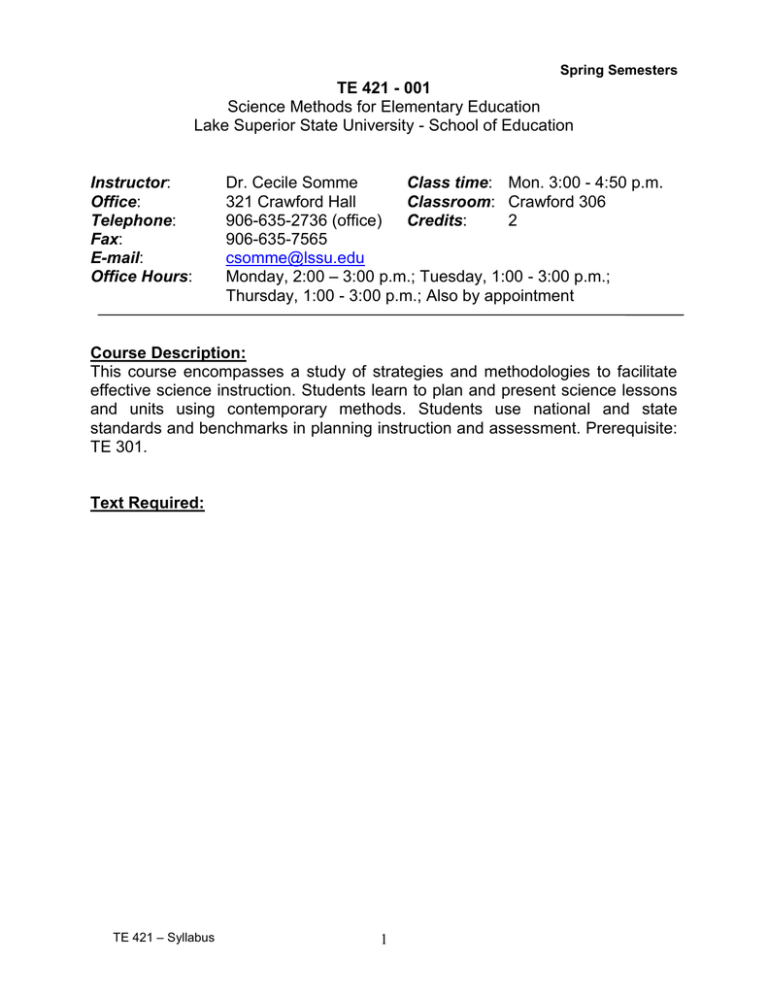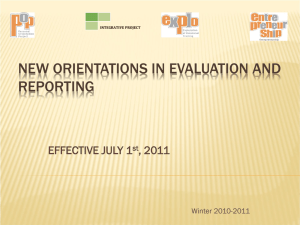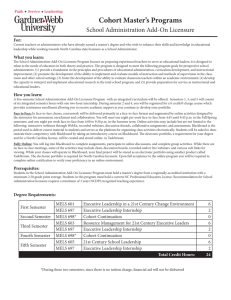TE 421 - 001 Science Methods for Elementary Education
advertisement

Spring Semesters TE 421 - 001 Science Methods for Elementary Education Lake Superior State University - School of Education Instructor: Office: Telephone: Fax: E-mail: Office Hours: Dr. Cecile Somme Class time: Mon. 3:00 - 4:50 p.m. 321 Crawford Hall Classroom: Crawford 306 906-635-2736 (office) Credits: 2 906-635-7565 csomme@lssu.edu Monday, 2:00 – 3:00 p.m.; Tuesday, 1:00 - 3:00 p.m.; Thursday, 1:00 - 3:00 p.m.; Also by appointment Course Description: This course encompasses a study of strategies and methodologies to facilitate effective science instruction. Students learn to plan and present science lessons and units using contemporary methods. Students use national and state standards and benchmarks in planning instruction and assessment. Prerequisite: TE 301. Text Required: TE 421 – Syllabus 1 Krajcik, J., Czerniak, C. and Berger, C. (2003). Teaching Science in elementary and middle school classrooms: A project-based approach, 2nd Edition, Boston: McGraw-Hill Higher Education Resources: Michigan Educational Technology Standards and Expectations (Grades K-8) Grades K-2 Grades 3-5 Grades 6-8 Grades 9-12 METS Checklist Grades K-8 for Teachers Michigan Curriculum Framework documents by Content Areas Science - Curriculum Framework Council of State Science Supervisors http://www.csss-science.org/safety.shtml MiCLIMB On-line - Clarifying Language in Michigan Benchmarks Technology enhanced lesson plans linking MCF to METS http://techplan.edzone.net/ci2006/ STAGE 1: DESIRED RESULTS Understandings: Pre-service teachers will understand that project-based science engages young learners in exploring important and meaningful questions through a process of investigation and collaboration. “Learning science is something students do, not something that is done to them.” (NRC, 1996) Essential Questions: How do I plan for project-based science in my classroom? How can I help all students learn science? Knowledge and Skills: At the successful completion of this course, pre-service teachers will: explain the importance of teaching science to all elementary and middle school students (Entry-Level Standards - MELS 1) describe current thinking and research on how children construct understanding in science (MELS 2) explain the key features of project-based science, the important benefits of using project-based science, and the challenges to implementing a projectbased curriculum (MELS 3, 5) explain and demonstrate the interrelationships among lesson objectives, TE 421 - Syllabus -2- standards and assessment (MELS 3) write lesson plans and develop units using the Understanding by Design approach (MELS 4) be familiar with current journals for children and teachers (MELS 5) demonstrate the ability to utilize appropriate technology in the teaching and learning of science (MELS 7) explain and demonstrate types of collaborative learning in the science classroom (MELS 6) explain and demonstrate strategies to manage the project-based science classroom (MELS 4) This course addresses standards for the preparation of pre-service science teachers through the following outcomes. The teacher candidate will be prepared to: use the Michigan Curriculum Framework K-12 Science Content Standards and Benchmarks as the critical foundation for teacher preparation, ensuring that elementary integrated science teachers have the content knowledge and the ability to teach this curriculum (DI Standard A) develop an understanding of the interconnectedness of all science, along with major unifying themes, and relates this understanding to the teaching of science (DI Standard B) understand and teach biology, chemistry, physics, and earth/space science as integrated content (DI Standard C) understand and promote the maintenance of a safe science classroom as identified by the Council of State Science Supervisors, including the ethical and appropriate use and care for living organisms and scientific equipment, and the safe storage, use, and disposal of chemicals; (DI Standard 6.0) http://www.csss-science.org/safety.shtml demonstrate competence in the practice of teaching as defined within the Entry Level Standards for Michigan Teachers; (DI Standard 7.0) create and maintain an educational environment in which conceptual understanding will occur for all science students (DI Standard 8.0) develop an understanding and appreciation for the nature of scientific inquiry (DI Standard 9.0) demonstrate competence in the practice of teaching through investigative experiences and by demonstrating the application of the scientific process and in assessing student learning through multiple processes (DI Standard 10.0) Stage 2: ASSESSMENT EVIDENCE 1. Field Experience (Requirement) The field experience consists of a minimum of 10 flexible hours to be TE 421 - Syllabus -3- completed throughout the semester. This is to be planned with the classroom teacher and must meet the university course requirements. The Field Experience log is available on the School of Education web site, http://education.lssu.edu. 2. Field Experience Report Students will complete a field report based on their observations and activities in their field placement. The report should include any connections between what is learned in TE-421 and field placement observations. (MELS 1, 2, 3, 4, 5, 6, 7) Students will share (5-minute presentations) with the class. Due Date: March 13, 2006 (Value: 10%) 3. Research Article Critique a) b) 4. Students will utilize theoretical research by writing a critique of one journal article related to the teaching of science (e.g., Science and Children, National Science Teachers Association; Educational Leadership, Association for Supervision and Curriculum Development). The critique should be double-spaced, typed and no more than three (3) pages in length. The first page should be a brief summary of the article, highlighting the major points. The remaining two pages should be a critical analysis of the concepts presented in relation to discussions in class, information in the textbook, other readings, and your experiences in the classroom. (Value: 5%) Students will share critique with class (5-minute oral presentation; may use PowerPoint, overheads, etc.). (Value: 5%) Due Date: January 23, 2006 Chapter Presentations In teams of 2 – 3, students will present a chapter to the class. Plan the lesson using UBD. Submit the lesson plan. Time: 1 – 1¼ hours. Be sure to engage classmates in discussion/activity. Assess (quiz, game, etc.) their knowledge. Criteria: indicate outcomes (desired results/expectations), involve students, assess to determine if outcomes (desired results/ expectations) have been met. Develop a rubric which peers will use to assess your presentation. (In addition, you will conduct a self-evaluation.) (Value: 25%) 5. Lesson and Unit Plans a) i) In groups of 2 – 3, students will complete one lesson plan for a project-based learning activity during the semester from the Michigan Content areas or the Ontario Expectations for Science and TE 421 - Syllabus -4- Technology and for the grade level in which they are doing their Field Experience. Students are encouraged to explore ideas on the internet and in science journals or other publications. A rubric for the learning activity will be designed using RUBISTAR at http://rubistar.4teachers.org/index.php (Preparing Teachers for Tomorrow Module 4). The format of the lesson plan will follow the Understanding by Design model available on the TASK STREAM web site. (Focus on MELS 4, 5, 7.) (Value: 5%) ii) In addition to sharing the lesson plan with the class, students will teach the lesson to the class. (approximately 30 minutes) (Value: 5%) Due Date: February 6, 2006 b) 6. i) In groups of 2 – 3, students will create (and teach in their field placement) a Science Unit demonstrating their proficiency in using the project-based science approach. The unit should include 6 class sessions on a science topic at the grade level of their field placement. Students will integrate technology in the creation of one form of assessment and one WebQuest for the unit (PTFT Modules 3 and 5 at http://ptft.merit.edu). The format of the unit plan will follow the Understanding by Design model. An important part of the unit will be a two- to three-page reflective summary describing what worked and what could be changed as a result of teaching the unit. (Focus on MELS 4, 5, 7.) The unit must address safety for each activity (refer to the Council of State Science Supervisors http://www.csss-science.org/safety.shtml )- , (Value: 10%) ii) Students will share unit plan and reflections with class (15-minute presentation; may use PowerPoint, overheads, etc.). (Value: 10%) Due Date: April 10/17/24, 2006 Reflective Learning Journals The purpose of the learning journal is to assist students in documenting and analyzing their learning toward the Entry-Level Standards for Michigan Teachers (MELS). The journal also serves as a record of personal development in TE421. At the end of each week, students will be required to write a one- to two-page journal reflection demonstrating their learning from the presentations, readings, and class discussions toward one or more of the MELS. (Focus on MELS 1, 2, 3, 5, 6.) Due Dates: February 20, April 17 (Value: 10%) 7. Quizzes / Activities / Assignments These will occur occasionally throughout the semester. (Value: 5%) TE 421 - Syllabus -5- 8. Professionalism (Focus on MELS 1, 5, 6) (Value: 10%) a) Attendance in this course is a requirement. In the event that you cannot attend class due to illness or an emergency, notify the instructor before class. It will be your responsibility to ensure that a classmate picks up copies of any handouts for sessions missed. Your presence in class is important to your learning. Most of the learning activities will require your interaction with your fellow students (learning triads and learning partners). If you are absent, you will not only miss the interactions/ presentations/discussions that take place, but you will also deprive your classmates of your input. b) Submit assignments promptly and professionally. Have a peer check for spelling, grammar and punctuation. c) Sources: If you have used an idea from any source, including the instructor and your classmates, acknowledge the source. Use an appropriate format (such as APA) for in-text citations and bibliographies. d) 9. Budget your time - You should expect to spend a total of 4 - 6 hours each week outside of class time doing reading, looking for resources, and completing assignments. Course Evaluation Field Experience Report (Specific to TE 421) Research Article Critique Chapter Presentations Lesson Plan Unit Plan Reflective Learning Journals Quizzes/Activities/Assignments Professionalism (Class Work, Preparation) Grading 98 - 100 94 - 97 90 - 93 A+ A A- 88 - 89 84 - 87 80 - 83 B+ B B- 10% 10% 25% 10% 20% 10% 5% 10% 78 - 79 74 - 77 70 - 73 C+ C C- Disability Services and Accommodations for Students TE 421 - Syllabus -6- In compliance with Lake Superior State University policy and equal access laws, disability-related accommodations or services are available. Students who require such services are to meet with the instructor to discuss their needs. Students will not receive services until they register with the Resource Center for Students with Disabilities (RCSD). Proper registration will enable the RCSD to verify the disability and determine reasonable academic accommodations. RCSD is located in the Library 149. The telephone number is (906) 635-2454. TE 421 - Syllabus -7- Stage 3: LEARNING ACTIVITIES TE 421 - Syllabus -8- Date Reading Assignments Topics 1 - Jan. 9 Introduction of Course Syllabus, Expectations/Professionalism. Chapter 1: Introduction, Why and How do we teach science? What are the goals of science education? Chapters 1, 2 2 - Jan. 16 Chapter 2: How do children construct understanding in science? What is Understanding by Design? Review of UBD lesson plan and UBD unit plan. Chapter 3 3 - Jan. 23 Chapter 3: What is a “driving” question? Chapter 8 4 - Jan. 30 Chapter 8: Why do we assess students in science? Chapter 9 5 - Feb. 6 Chapter 9: How is student understanding assessed? Chapter 4 6 - Feb. 13 Chapter 4: How are scientific investigations Chapter 5 developed? 7 - Feb. 20 Chapter 5: How can learning technologies be used to support investigations? 8 - Mar. 6 9 - Mar. 13 10 - Mar. 20 11 - Mar. 27 Chapter 6: How do I develop collaboration in the science classroom? Chapter 7: How do I develop and use benchmark lessons? Chapter 11: How do I plan a project-based curriculum? Chapter 10: How do I manage the projectbased science classroom? 12 - Apr. 3 13 - Apr. 10 Chapter 12: What are the next steps? 14 - Apr. 17 Presentations Assignments Due Bring Science Standards/ Expectations to next class Research Article Critiques and Oral Presentations Lesson Plans and Presentations Reflective Journal #1 Chapter 6 Chapter 7 Chapter 11 Field Experience Report Chapter 10 Chapter 12 Unit Plans and Presentations Reflective Journal #2 15 – April 24 TE 421 - Syllabus -9-




